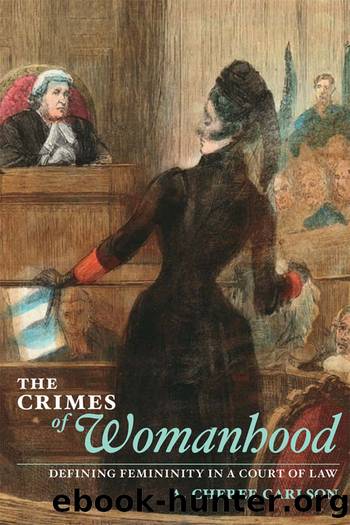The Crimes of Womanhood by A. Cheree Carlson

Author:A. Cheree Carlson [Carlson, A. Cheree]
Language: eng
Format: epub
Tags: Social Science, General, Women's Studies, Law, Gender & the Law, History, United States, 19th Century
ISBN: 9780252090769
Google: zUBOMOTeL1MC
Publisher: University of Illinois Press
Published: 2010-10-01T02:42:42+00:00
Q: How long had you been at the house living there?
A: Two years and nine months.
Q: Did you have any trouble there in the family?
A: No, sir.
Q: Not at all?
A: No, sir.
Q: A pleasant place to live?
A: Yes, sir, I liked the place.
Q: And for aught you know, they liked you?
A: As far as I know, yes.
Q: Treated you well?
A: Yes, sir, they did.
Q: It was a pleasant family to be in?
A: I donât know how the family was; I got along all right.
Q: You never saw anything out of the way?
A: No, sir.
Q: You never saw any conflict in the family?
A: No, sir.
Q: Never saw the least,âany quarreling or anything of that kind?
A: No, sir, I did not.
Q: And during the whole time that you were there? You were there two and a half years, I think you said?
A: Yes, sir, two years and nine months.
[ . . . ].
Q: How was it this Thursday morning after they came downstairs?
A: I donât remember.
Q: Didnât they talk in the sitting room?
A: I heard her talk as she came along.
Q: Who spoke?
A: Miss Lizzie and Mrs. Borden.
Q: Talking in the sitting room?
A: Mrs. Borden asked some question and she answered very civilly. I donât know what it was.
Q: Who answered civilly?
A: Miss Lizzie answered.
Q: Answered properly, all right?
A: Yes, sir.
Q: When you heard them talking, they were talking calmly, the same as anybody else?
A: Yes, sir.
Q: There was not, so far as you knew, any trouble that morning?
A: No, sir, I did not see any trouble with the family. (1: 254â57)
Since there was a possibility that Sullivan had seen quarrels, he began by asking her about whether it was a good situation for her. Thus, if relationships were remarkably bad, he could stop. He then spent some time asking about the family in general. Only when it was fairly certain that things had gone smoothly did he ask about Bordenâs demeanor on the day of the crime. Even though Knowlton couldnât get Sullivan to state that the women were friendly, he got her to admit that they did not fight. Lizzie Borden was polite and civil, if not exactly affectionate.
Her affections, it appeared, were saved for her father. Jennings made sure to question Emma Borden on how well those two got along. She testified to an especially sentimental token of loveâa ring that Lizzie had given Andrew fifteen years earlier. He wore it constantlyâin fact, it was the only piece of jewelry he ever wore. He was buried with it. He apparently did not even own a wedding ring as a token for Abby, but Lizzieâs ring he kept religiously (2: 1530).
This narrative was taken as a sign that father and daughter were close. Even if Borden had hated her stepmother, how on earth could she have brought herself to kill her father? Bordenâs proper filial love was her alibi for the second killing, and weakened the claim that she would have committed the first. Since the scenic narrative of a
Download
This site does not store any files on its server. We only index and link to content provided by other sites. Please contact the content providers to delete copyright contents if any and email us, we'll remove relevant links or contents immediately.
Tor and the Dark Net · Remain Anonymous Online and Evade NSA Spying (Tor, Dark Net, Anonymous Online, NSA Spying) by Smith James(206)
The Love Conspiracy: An Age-Gap Lesbian Romance by Arias J.J(169)
Carl Schmitt Between Technological Rationality and Theology by Hugo E. Herrera;(158)
If We Burn by Vincent Bevins(151)
Women before the court by Lindsay R. Moore(121)
Witches, Wife Beaters, and Whores by Elaine Forman Crane(106)
Covering Muslims by Erik Bleich;A. Maurits van der Veen;(106)
Defensive Nationalism by B. S. Rabinowitz;(105)
The Crimes of Womanhood by A. Cheree Carlson(103)
The Will to Punish by Fassin Didier;Kutz Christopher;(101)
Sexual Violence in Conflict and Post-Conflict Societies by unknow(100)
Defining Girlhood in India by Ashwini Tambe(99)
To Raise and Discipline an Army by Joshua Kastenberg(98)
Critique of the Legal Order by Richard Quinney Randall G. Shelden(96)
Police Matters by Radha Kumar(92)
International Humanitarian Law and Justice by Mats Deland Mark Klamberg Pål Wrange(91)
A New Daddy by orphan_account(91)
Advisory Boards in Medium-Sized Companies by Daniel Graewe(87)
History and Power in the Study of Law by June Starr Jane F. Collier(86)
